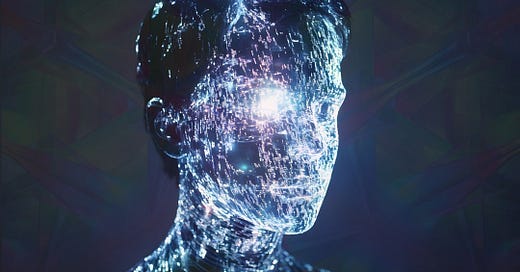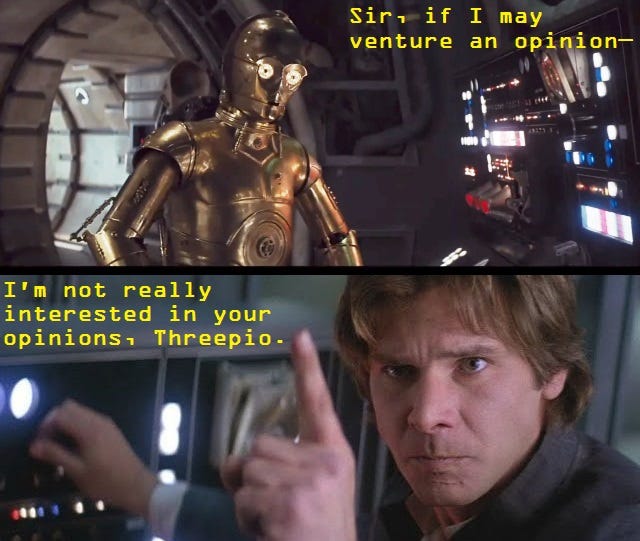Infinite Lock-In, part 4
Who thinks we can mind-upload? What scheme is being proposed for the Singularity?
Digital Heaven
In part 2, “Spiritual Suicide,” unpacking Jaron Lanier’s critique of cybernetic totalists, I illustrated their religiosity by summarizing their assumptions:
Nothing is ineffable; there is no soul. Treating people as reducible to information risks nothing. A sufficiently lifelike simulation of reality à la The Matrix would offer all the experience that reality itself offers and therefore would be essentially the same thing. If only we could upload our minds to a computer cloud, we could live there forever with no loss.
Now, I can well imagine someone might object: “You’re straw-manning the so-called cybernetic totalists! No one is proposing we ditch our bodies en masse and go live in the cloud! And if you say, ‘They’ll propose it eventually,’ that’s nothing but a slippery slope argument! Fallacious slings and arrows!”
As a former composition teacher, I appreciate attempts to play whack-a-fallacy, but if you believe no one is already proposing such a thing, you’re wrong. Some people are proposing “mind-uploading” — and not just kooky Ray Kurzweil, who predicts we’ll be able to do it by sometime in the 2040s. If you think the proposal hasn’t penetrated the ranks of the tech elite, take a gander at what Elon Musk wrote on X in response to a user’s inquiry only a few months ago:
Eventually, you will probably be able to upload a good approximation of your memories & mind state to “the cloud” with the ability to download it to a humanoid robot.
You obviously won’t be quite the same as you are today.
—Elon Musk (@elonmusk) on X, 16 August 2024
A good approximation, eh? Not quite the same?
Thanks for at least nodding to sanity in passing, Elon! It’s a relief to know you own Neuralink, the company on the cutting edge of brain-computer interface tech.
It’s true that even most folks who think mind-uploading is possible aren’t proposing a species-wide leap into the Matrix. Nor do I believe anyone is suggesting we “ditch our bodies” via euthanasia at some predetermined age à la Logan’s Run and, having sucked all the marrow out of biological existence, we bypass old age and death (which must be experiences of no value), making directly for digital heaven. I don’t think even Ray Kurzweil is deluded enough to try selling that idea to people.
Instead, what he and many others in the Singularitarian tribe appear to be selling is this scheme: we extend human life as far as possible, and when it’s finally no longer worth extending any further, or when death threatens to claim us anyway, we laugh in death’s face and make for digital heaven. In this case, elective euthanasia is still on the table — it doubtless needs to be — but no one’s getting gassed against their will.
I can just picture the ad copy:
It’s the ultimate insurance policy, folks! What if — oh, horrors! — you’re wrong about the afterlife? What if there’s no afterlife?
We can give you one! An afterlife of your choosing! Just think of the possibilities!
What do you say to downloading endlessly into newly minted bodies, genetically engineered to perfection? To be young again — taut, fit, supple, curvy in all the right places! To get back that youthful get-up-and-go! To do it — and I mean do it, if you catch my drift — as many times as you want!
That’s right, folks, we found the Fountain of Youth! And it can be all yours for the low, low price of more money than you can guess at!
Low credit score? Forget the body! Become a digital avatar! Board our starship and go roaming! See the marvels of the galaxy for less than thirty Altairian dollars a day!
It’s our most popular option, so you’ll have plenty of company! If you think social media’s a hoot, get ready for an eternity of it!
Really cash-strapped? Never fear, we’ve got an appealing economy option for you... Download into a robot! We promise no one’s ever going to switch you off, no matter how annoyed they get with you!
Really, though, we need not traffic in such outlandish eventualities to see that what the cybernetic totalists assume about existence is myopic, possibly dangerous, and what their assumptions can bring about is potentially dystopian.
Supposing mind-uploading is possible, what are we talking about uploading? What is “a good approximation of your memories and mind state”? Just how good can such an approximation be?
Do we want to live as approximations of ourselves? What about reality itself? Will that be an approximation, too?
What if digital heaven turns out to be digital hell? And what if, once we’re there, we can’t undo it?
These questions and more to come in “Infinite Lock-In.” Stay tuned!
< Previous part | Series page | Next part >
Interview with Anders Carlson-Wee
An interview I conducted with the poet Anders Carlson-Wee about his collection Disease of Kings (Norton, 2023) is out now at Michigan Quarterly Review Online.
At the heart of the book is a touching friendship between two young men, an odd couple living large on dumpster-diving. As its speaker’s every emotion burns, Disease of Kings paints an intimate, tenebristic portrait of an artist who chooses material poverty only to unearth spiritual wealth.
In the interview, Anders and I discuss formal limitations, hard craft lessons, dialogue between the book’s poems, how a writer enters expansive consciousness and what can be found there, and loneliness.
Many thanks to Anders for giving the interview and to the folks at MQR Online, especially Diepreye, for giving it a home.
Read the interview here: https://sites.lsa.umich.edu/mqr/2024/11/gratitude-in-the-margins-an-interview-with-anders-carlson-wee/






